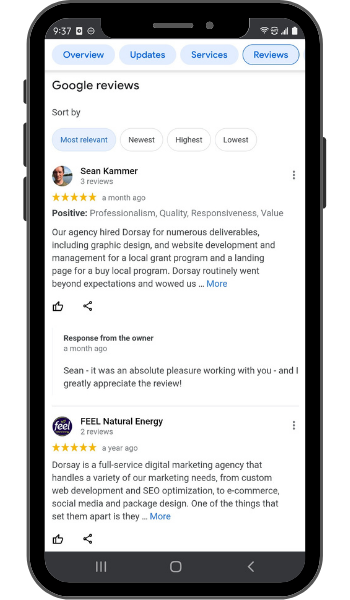When you search for a place to visit on Google Maps, what’s the first thing you generally do? Well first, you probably check out the business’s hours of operation. But next? We’re willing to bet you click the five little yellow stars underneath the business’s name––revealing a drop-down of countless anonymous and identifiable reviewers. And guess what? Your customers and prospective clients are doing the same thing when they look up your business.
Though good Google reviews can absolutely make or break your business, we think it’s time to discuss the importance of responding to your Google reviews and how to craft the perfect response.
Does Responding to Google Reviews Help SEO?
In digital marketing, probably one of our biggest questions we get asked often is “does responding to Google reviews benefit local SEO?” And before we give you a straight ‘yes’ or ‘no’ answer, we thought it’d be helpful to give you a small insight into the importance of online reviews.
These days, around 88% of consumers trust online reviews as much as personal recommendations. What’s more? 97% of consumers say online reviews influence their buying decision. With these figures in mind, it’s easy to see that online reviews impact the success of a business more than most brands realize. Unfortunately, brands fail to realize just how crucial it can be to implement Google reviews into their digital marketing strategy.
How Google Feels About Businesses Responding to Reviews
According to the Google My Business support page, businesses should “interact with customers by responding to every review left on a Google My Business listing. Responding to your customer’s reviews shows that you value your customers and the feedback that they leave about your business.” In addition, Google says that “high-quality, positive reviews from your customers will improve your business’s visibility and increase the possibility that potential customers will see your listing.”
In other blogs, we’ve discussed how engagement is one of the best ways to boost your brand’s online visibility. And Google knows this. Not only does responding to reviews build trust with your customers, it also builds trust with Google. Google’s main goal is to recommend highly credible businesses to their customers. By responding to reviews left by your customers you’re feeding Google’s EAT (Expertise, Authority, and Trustworthiness––three factors Google uses to determine the credibility of brands and websites.)
Needless to say, Google is encouraging businesses to respond to their Google My Business reviews in order to improve their SEO.
Responding to Google Reviews Makes You Trustworthy
Whether the reviews you receive are positive or negative, respond to them! In today’s media, you’ll notice that people who receive negative comments and remarks are more likely to recommend letting them “roll off your back.” However, passive treatment to negative online remarks is not recommended. Instead, you need to take time to reach out to the reviewer and gain honest feedback about what went wrong, and how you can make the situation better.
Honestly, 9 times out of 10, customers are willing to communicate with you and allow you to resolve the situation.
Responding to negative reviews can create positive results, too. In fact, handling negative reviews with patience and understanding can result in customers re-writing a former review or deleting the review altogether.
Remember, your customers are not just numbers in Google Analytics. They’re real people who just want to have a positive experience. Give them one.
A Few Ways to Respond to Google Reviews
When crafting your response to an online review, you can easily follow these steps and adjust them to fit your brand’s voice:
- Respond in a timely manner. With online reviews, the sooner you reply, the better. We recommend not waiting more than 24 hours before replying.
- Address your reviewers by name. In business, it’s easy to just see a username and use that to address customers. However, you want your business interactions to be as personal as they can. When Richard R. leaves a positive review, start your response by addressing him by his first name. Ex: “Hi, Richard! Thank you so much for the positive feedback!”
- Keep it short and sweet. Responses to positive reviews shouldn’t be a paragraph long. Keep your responses short and always remember to thank your customer at the end.
- Share positive feedback. After you respond to positive feedback, share it on your company’s Instagram Story, or other social media platforms. In addition, you can also add positive reviews to your website’s testimonials page.
So many business owners are too worried about finding new leads that they forget about their loyal, existing clients. When you take the time to express gratitude to each and every one of your customers, you’re likely to earn and build customer loyalty.






